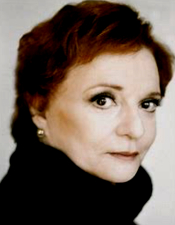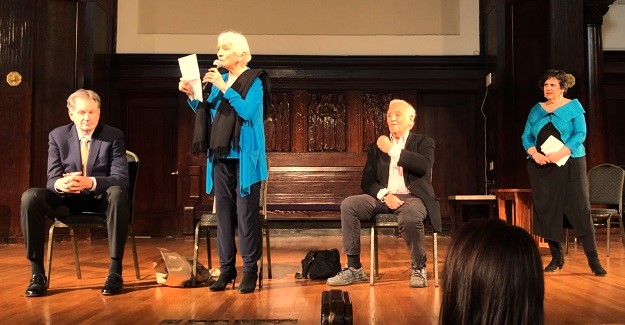

Louise Lasser
Carole Shelly 
Susan Charlotte |
News & NotesDouble Feature Film ScreeningCause Célèbre Productions recently presented three sold-out special screenings of Did You Know My Husband? alongside Woody Allen's Bananas at New Plaza Cinema in New York City. The afternoon began with Did You Know My Husband?, a poignant and suspenseful drama written by Susan Charlotte and directed by Antony Marsellis.  
Carole Shelly Louise Lasser The teleplay stars Louise Lasser and Carole Shelley as women who find themselves in a quiet, post-Thanksgiving encounter that gradually unfolds into a haunting revelation of shared history. With a subtle, layered script and an evocative original score by Billy Goldenberg, the teleplay, originally broadcast on PBS, left a powerful impression, prompting reflection on memory, grief, and unexpected connection. Following the screening, a lively and intimate talkback was held with Louise Lasser, offering rare insight into her experience working on the film, her creative collaboration with Susan Charlotte, and her reflections on a career that spans decades. The conversation explored the emotional depth of Did You Know My Husband?, touching on themes of isolation, identity, and rediscovery. Audience engagement made for a dynamic Q and A that celebrated both Lasser's work and Cause Célèbre Productions commitment to producing meaningful stories that blend art with social consciousness.

The Bread and Roses GalaCause Célèbre Productions held its Bread and Roses Gala at the Society for Ethical Culture on Central Park West. The afternoon featured a powerful performance of Unlucky Gal: The Jane Doe Story, followed by a moving tribute to iconic folk singer Judy Collins, legendary attorney Martin Garbus, and former NYPD Deputy Chief Mike Osgood. The event concluded with an exclusive VIP reception. Named after one of Judy Collins' albums and inspired by the enduring political slogan "Bread for all and roses too," the Bread and Roses Gala celebrated both sustenance and spirit, honoring those who champion dignity, justice, and artistic courage.

Unlucky Gal: Why I Had to Tell Jane Doe's Story
by Susan Charlotte 
Susan Charlotte These haunting words, spoken by a woman known only as Jane Doe, struck me to the core. A gay, Black 27-year-old woman, Jane Doe was brutally raped in Prospect Park in April 1994. What followed was equally devastating. Within days, New York Daily News reporter Mike McAlary published an article calling her assault a hoax. Despite police evidence and eyewitness accounts, he wrote two more articles accusing Jane Doe of fabricating the entire event. He never spoke to her, never visited the crime scene, and ignored lab and hospital reports. His words didn't just undermine Jane Doe's truth; they set a dangerous precedent. After being discredited publicly, Jane Doe walked into famed First Amendment attorney Martin Garbus's office seeking not money, but simply an apology. She never got one. Her lawsuit was dismissed in 1997. Emotionally destroyed, Jane Doe faded from public view. But truth doesn't vanish. Facts don't disappear. In 2013, Garbus watched Lucky Guy on Broadway. The play, written by Nora Ephron, portrayed McAlary as a lovable rogue, a crusading journalist with a heart of gold. As the audience applauded, Garbus sat frozen. What the play celebrated as gritty journalism, he knew to be a grave injustice. Where was Jane Doe's story? Garbus published a searing op-ed in The New York Times asking the same question: Who will tell Jane Doe's story? Years later, that question became my call to action. With Garbus's guidance and insight from Michael Osgood, former Deputy Chief of the NYPD's Special Victims Division, I began work on Unlucky Gal: The Story of Jane Doe at the start of the pandemic. It's not just a play, it's a response, a reckoning, a way to right a wrong through the power of theatre. In a remarkable turn, nearly 24 years later, Deputy Chief Osgood heard a radio broadcast about Jane Doe and Lucky Guy. He remembered the case and reopened it. Digging through more than one thousand cartons of evidence, Osgood located her original jogging shorts, which still contained DNA evidence. Within weeks, Jane Doe's rapist was identified: a serial offender already serving life. For the first time, Jane Doe received official, scientific, undeniable confirmation that she had told the truth all along. Finally, after 23 years, John Miller, the NYPD official who originally cast doubt on her credibility, apologized. But how does one measure the cost of a twenty-three year silence? Unlucky Gal exists because Jane Doe's voice matters. Because truth matters. Because art can confront injustice where systems fail. It brings together four brave individuals who dared to fight back against a culture that disbelieved and discarded survivors.
Three decades have passed. But it's not too late to say her name, tell her story, and
say: "we see you now." Unlucky Gal is not just a recounting of what happened, it is a
demand that we do better. We owe Jane Doe that much. And so much more.
|